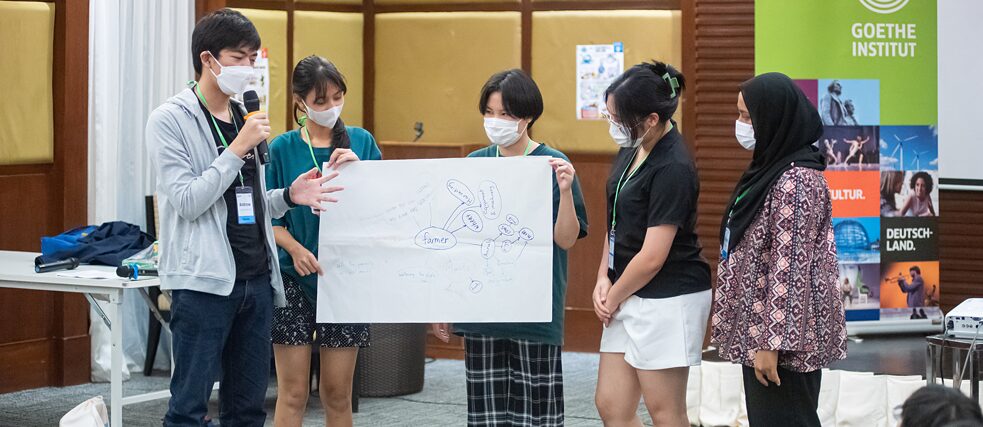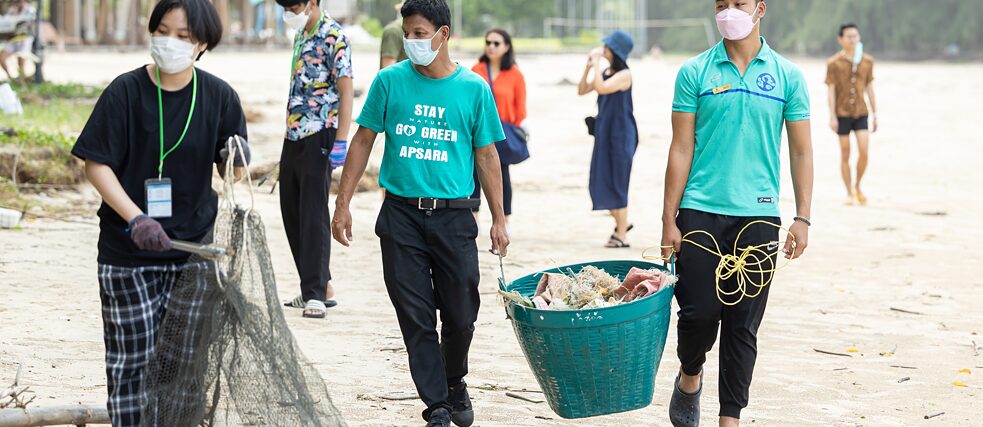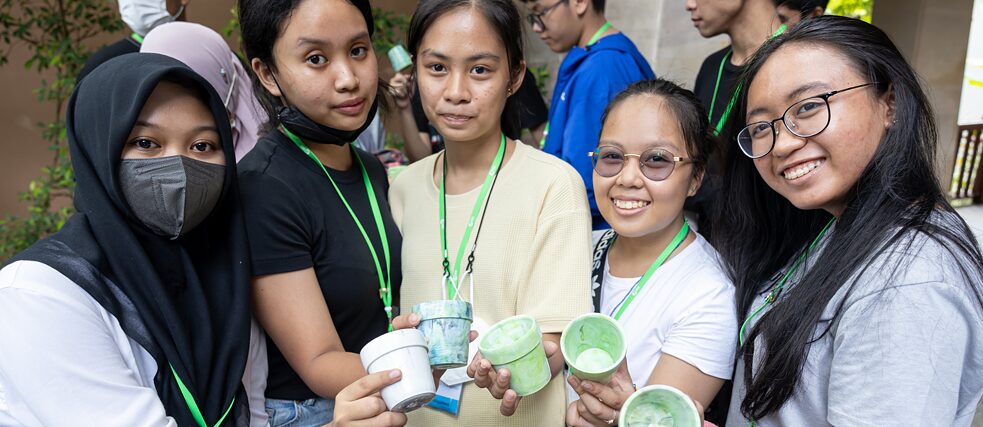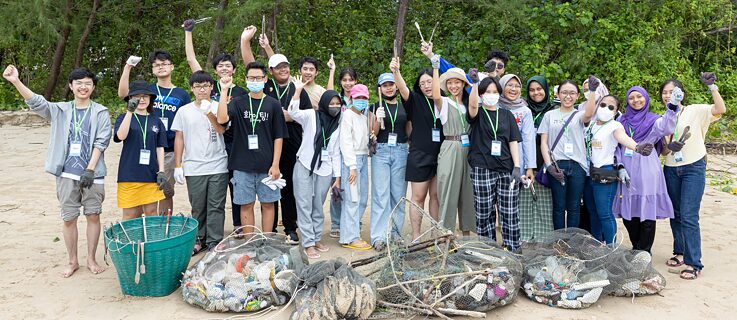How do you work with young people from six countries on the topic of sustainability and learn German at the same time? With the regional project "Network Climate", the Goethe-Institut in Thailand enabled 24 young people and six accompanying teachers to participate in a multifaceted and eventful event.
From face-to-face to live online teaching
The Covid 19 pandemic had far-reaching, often negative effects on foreign language teaching as well, since established teaching scenarios could no longer be carried out as usual. The result of this sudden "
digitalization with a crowbar" was often foreign language teaching that reverted to didactically outdated forms of teaching (frontal, teacher-centered, native-language, etc.) and quickly destroyed didactic-methodological principles that had been laboriously developed over the years.
The consequence of this was not only a quantitative decline in the number of fit exams taken, with poorer results at lower levels, but also a decline in the motivation of young German teachers, which was perceived as a greater threat to the successful teaching of German as a foreign language in Thailand.
As Bolte-Costabiei and Häring explain in “
123 Teaching Techniques”, it is of course possible to carry out learner-centered, communicative, and action-oriented instruction digitally, but this is rarely the case due to the suddenness of the digital revolution and often insufficient knowledge of digital teaching and learning platforms.
From face-to-face to a hybrid project
The idea for the
Netzwerk Klima regional project was developed before the pandemic, and is based on so-called interdisciplinary (FüDaF) teaching as a pedagogical concept, with foreign language German teaching incorporating aspects of subject teaching.
Originally developed as a pure face-to-face class, the project was thus post-pandemically extended to a hybrid project, with two digital meetings before and two digital meetings after the camp. Similarly, this decision took into account the comparative, interdisciplinary, but also multi-perspective nature of the project.
In the future, students should be able to critically question and compare problems on the topic of "environmental protection & sustainability" and approach them with alternative solutions from different perspectives. All of this with as many German components as possible, since the promotion of the German language is one of the most important goals of the Goethe-Institut's language work.
Network Climare - digital: before the camp
The regional project Network Climate was open to four young learners of German from each of the following countries: Malaysia, Myanmar, Indonesia, Philippines, Thailand and Vietnam, who had a German language level of at least A2 of the Common European Framework of Reference (CEFR), showed interest in the topics of "environmental protection & sustainability" and agreed not only to participate in the present camp, but also to accompany the entire phase (also digitally) and subsequently to implement a similar sustainability project together with other students from their home country.
Thus, the first two digital meetings served not only to get to know the students and the organizing team, but also to learn more about the tasks and the program and to apply German language skills. Experience has shown that the latter aspect in particular is not always easy at low levels with students from different countries in the Southeast Asia region, as German is taught as a second, sometimes even only as a third foreign language.
The first step was therefore to reduce inhibitions among young learners of German and at the same time to strengthen their self-confidence. They introduced themselves in German and told in a few words about themselves and their everyday life. Three languages were used at these meetings (German, English, native language), because this is also an important signal for young people: "Dare to speak German. If you lack the words, English is not taboo."
The organizing team thus spoke low-threshold German, the participants responded in German or English, and in some breakout rooms, communication was in the mother tongue at the beginning, because the young people, although from the same countries, came from different schools and first had to get to know each other.
Digital meetings are even advantageous here, since participants are in an environment they are used to and technical possibilities (such as setting up so-called breakout rooms) can create private atmospheres.
Network Climate – face-to-face: the language camp
At the camp, which took place from July 30 to August 6, 2022 in Khao Lak (Thailand), the focus was on three aspects:
- Learning/using/improving German.
- Acquire expertise on the topics "environmental protection, sustainability and sustainability goals
- Realize projects on "environmental protection & sustainability" in the countries of origin
During the week together, the participants of the Network Climate discussed topics such as environmental protection, consumption and sustainable development, learned a lot and developed their own projects, mainly in German. In the process, the participating students inductively acquired discourse strategies that they needed to formulate technical solutions to problems. Where they were unable to make progress in German, they switched to English in order to minimize barriers to the content of the work.
-
 Photo (detail): Goethe-Institut Thailand
Photo (detail): Goethe-Institut Thailand
During the youth camp, the teams worked on concrete projects.
-
 Photo (detail): Goethe-Institut Thailand
Photo (detail): Goethe-Institut Thailand
Garbage collection action on the beach
-
 Photo (detail): Goethe-Institut Thailand
Photo (detail): Goethe-Institut Thailand
Flower pot from recycled plastic.
A conscious decision was made in advance for this: project-based, action-oriented German lessons on the topics of "environmental protection and sustainability" in the morning; the transfer of technical knowledge, the learning of practical skills and competencies, as well as support in the development and implementation of own project ideas in the second half of the day.
Since the German language skills of young people in the Southeast Asia region rarely exceed the A2 level, the task was to define a concept for teaching skills at this level. For this purpose, Rainer E. Wicke, who is well known to the authors of this text from various projects, developed tasks and exercises at the aforementioned level, including a teacher's commentary. The first priority was communicative and action-oriented interdisciplinary DaF lessons, which were dedicated to the topics "environmental protection & sustainability".
These lessons had a scope of four teaching units daily, were conducted by teachers of the Goethe-Institut Thailand and thematically always anticipated aspects of the project-based lessons in the afternoon in order to make it easier for the young people to act in German technical language.
After lunch, the project partner
Traidhos Three-Generation imparted both technical knowledge and skills and worked out strategies together with the young people on how they could use these in a meaningful and targeted way in their projects.
Network Climate - digital: after the camp
During the camp, the young people were trained as environmental ambassadors and the
Netzwerk Klima environmental club was launched. (Founding) members of this environmental club were all students participating in the event, their accompanying teachers, but also other students who could not attend the camp in Khao Lak were open to active participation.
The environmental club had three project phases:
- Research and name environmental problems in the home country (before the camp)
- Develop a project on "environmental protection & sustainability" (during the camp)
- Implement a project on the topic of "environmental protection and sustainability" (after the camp).
Experience has shown that excitement and interest often wane in the aftermath of a present-day encounter project, which is why an important aspect was defined in advance as an application requirement: "Willingness to implement a project on the topic of 'Environmental Protection & Sustainability' with other students from the home country after the camp and to bring the environmental club to life together with others."
The digital meetings after the camp were therefore dedicated to both the joint exchange and the presentation of these projects. During the project phase, their supervisors, who already knew them from the digital meetings before the camp, continued to support the young people, helping them with the implementation and ensuring that tasks were completed and deadlines met.
Network Climate - an experiment
In November 2020, there was already a similar event in Khao Lak: a camp on the topic of "Environmental Protection & Sustainability". This analogous project (due to the pandemic) was only aimed at Thai students, but had a similar claim: learning, applying and improving German in one half of the day, project-based workshops in the other half. The integration of digital elements, young participants from six countries and an extended project phase afterwards were new in 2022.
Events such as
Netzwerk Klima should therefore serve as a model for other teachers and encourage them to boldly use FüDaF elements in their teaching, to integrate digital elements in analog meetings as well, and to give young people the freedom to develop and implement their own project ideas.
Conclusion
The project has shown that a seminar on sustainability and environmental protection can be designed using the blended learning method not only at one school, but even across regions. Partnership-based, action and project-oriented learning considers the students' lifeworld by making them aware of environmental problems they are confronted with on a daily basis. The fact that students from different countries in Southeast Asia worked and learned together in partnership motivated the students to also acquire language skills in the sense of FüDaF.
Read more:
- Janschitz, G., Zehetner, E. & Fernandez, K.: Digitalisierung mit der Brechstange, Zeitschrift für Bildungsforschung 12, 387-406 (2022)
- Bolte-Costabiei C., Häring S.: 123 Unterrichtstechniken, Goethe-Institut Thailand 2021
